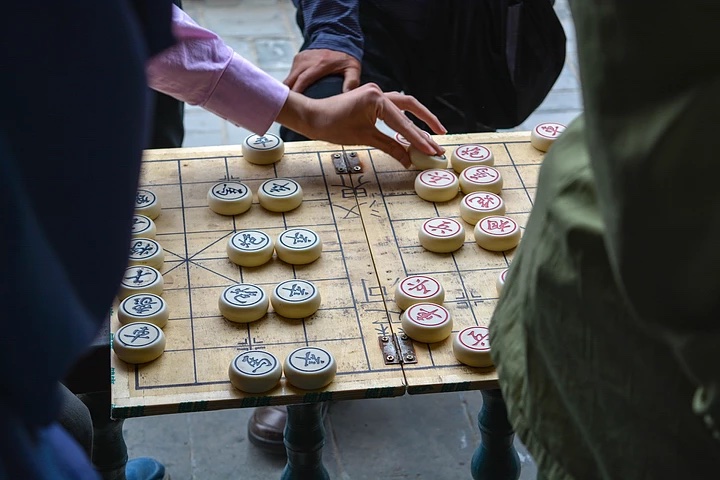Your hidden playbook
Uncovering the roots of conflict in the workplace
Imagine for a moment that you were sitting down with a group of people to play a new board game. It’s a somewhat complex game. It looks similar to others you’ve played in the past and everyone knows the objective goal, but the players, the cards, and the landmarks on the board are unfamiliar. Each player has a copy of the rules. Should be easy enough to figure out, right?
But there’s a twist: each copy of the rules is slightly different, and none of you playing the game knows it.
Each of you dutifully studies your own print-out of the rules, assuming they are the official game rules. When you finish reading, you put the rules back into the box, out of reach, and then play begins. Confusion quickly begins to spread, as the other players’ strategies appear baffling and often out-of-bounds compared to the rules you just learned. Confusion turns to frustration and chaos as each of you cites “the rules” as evidence that you are doing things correctly and the others are not.

This hypothetical board game would be maddening to play – though admittedly part of me does want to create this as a social experiment. The bad news is that this is a perfect analogy for life: the board game represents any interpersonal relationship, and the differing rules represent what we learned early in life as the “truth” about how the world works.
Beyond a basic, instinctual understanding that survival is important (the object of the game), when you get right down to it, there is shockingly little universal consistency about what that means or how to achieve it. We humans have been trying to figure it out through trial and error, each generation’s findings transmitted like an accidental game of Telephone to the next generation, and so on to the next generation and the next. The end result is that, regardless of everyone’s best intentions, each of us winds up with a wildly divergent set of implicit rules and “truths” about what the world is like, who we are in it, and how to most effectively navigate toward the objective.
There’s nothing inherently wrong about that. The trouble is that, much like the twist in our hypothetical board game, for the most part we don’t realize that our inherited rules and truths are different from anyone else’s. In real life, we don’t have a printed copy to refer to. Most of these beliefs were handed down through subtle, unspoken messages and internalized at such a young age that we don’t even realize the playbook exists.

When we’re not fully aware of our own inherited playbooks, much less those of other people, confusion, frustration, miscommunication, and hurt is bound to arise at times when we’re thrown together in pursuit of a goal – because we naturally assume that everyone’s baseline understanding of how things should be done is more or less the same. This source of confusion and conflict can manifest in any domain of life, though arguably less in our personal lives, as we tend to seek out and stay with people who share a mostly overlapping or complementary set of rules with us because they “get it” and familiarity is comforting. I see it cropping up most frequently in the workplace, where total strangers with often clashing beliefs about how life works are grouped to collaboratively solve a complex puzzle.
To be clear, I’m not knocking, or even really talking about, obvious sub-cultural differences. By now I think we’re all pretty well-versed in the many benefits of team diversity in terms of race, gender, age, politics, religion, and so on. Rather, I’m talking about much subtler differences in the emotional rules we each play by. These rules often transcend nationality, language, generation, etc. They are so deeply ingrained that most of the time we aren’t aware they exist and thus can’t do a rational reality check on them.
To make this a little more concrete, here are some examples of common emotional rules we may unwittingly be operating by:
- Authority figures cannot be trusted – or – Authority figures must be obeyed no matter what
- I am not good enough, so I shouldn’t even bother trying – or – I am not good enough, so I must make a superhuman effort at all times so nobody else figures it out
- Maintaining peace is more important than speaking the truth – or – Speaking the truth is more important than any amount of destruction it may cause
- It is my responsibility to mind-read and preemptively fix everyone else’s problems – or – If they really cared, everyone else would read my mind and preemptively fix my problems
- My experiences/feelings/perspectives are not valid – or – My experiences/feelings/perspectives are more valid than anyone else’s
- Subtle politicking and manipulation are the only ways to get my needs met – or – Vocally pushing my agenda is the only way to get my needs met
- If I make a mistake, I am a worthless fraud – or – Everyone should unconditionally love even my rough edges
- Thoughtfully considering all sides of an issue and building consensus is the best way forward – or – Creative destruction and aggressively blazing my own trail is the best way forward
- It’s a dog-eat-dog world and I can’t rely on anyone but myself – or – People are basically helpful and here to support my dreams
- Money is the only way to guarantee safety – or – Relationships are the only way to guarantee safety
- Change is a threat. The unknown is dangerous – or – Absence of change is a threat. I can’t get hit if I’m a moving target
The existence of these kinds of emotional rules is almost never recognized, much less addressed in the workplace (or anywhere else). The closest we get to discussing these issues in a professional context is in the rare times we may engage in something like a StrengthsFinder assessment as a team. But even great tools like that just lump us into broad categories and steer a wide berth around the more specific, sensitive, buried early life messages that we’re still carrying, like those listed above. And getting to that level of depth – the awareness and root source of our rules – really does matter if we expect any assessments, feedback, coaching, or growth to truly take hold.
To use an example from my own life, pretty much every piece of feedback I’ve ever received, from kindergarten report cards to 360 assessments in my last office job, has included a line saying “you need to be confident and speak up more often.” The context may have changed over the years, but this was undeniably a common thread that I was bringing with me everywhere I went. I knew they were right; I was painfully shy to the point of near-muteness as a child, and while I got better with age at speaking socially, I still imploded at the thought of having to say anything personal or controversial as an adult.
So even though I received and intellectually accepted accurate and meaningful feedback about something I needed to work on, I was still never able to change the behavior. Part of me always (silently) responded to that feedback with “Ok sure…but that’s never gonna happen.” And I think this is where many of us get stuck in our growth.
It took a lot of examination and blunt conversations with myself to get to the root of this particular tendency, so that I could examine it clearly and be able to make a rational and informed decision about how and whether it was serving me. I had to reach the subconscious belief that was governing my chronic inability to vocalize my perspective and needs.
When I allowed myself to write it down, here’s what came out: “It is unsafe to speak. My words are not welcome. What I share gets used against me.”
Though getting to the point of being able to articulate that “rule” and many others like it was certainly not the most fun way to spend my time, it was profoundly liberating. It’s the feeling when just the right word finally comes to you after having it stuck on the tip of your tongue – for thirty years.

Getting that explicit about what had been driving this particular behavior opened up two important things for me. First, it gave me the opportunity to compassionately recognize, process, and heal the very real place that belief came from. Second, having it spelled out in black and white allowed me to see how inaccurate and outmoded that rule was when applied to my current circumstances as an adult. Examining the belief head-on sucked the power out of it, and gave me my first taste that perhaps a better way realistically existed and was accessible to me, without triggering vague feelings of fear and vulnerability.
A great way to start uncovering and getting some perspective on your own playbook is to notice when you have a disproportionately intense and quick reaction to a situation. The next time you find yourself banging your head against a wall or fighting the urge to send a snarky email or choking back tears in response to someone’s incomprehensible behavior, check in with yourself. What’s the strong emotion that was immediately triggered, even though you rationally knew better? Where/when/who is that coming from? What “rule” of yours did they just violate?
For example, I’ve had a few colleagues over the years who, when frustrated, had a habit of sending strongly worded accusatory emails to whoever they were frustrated with and copying their entire team. While we can all agree that’s poor corporate citizenship and generally not an effective tactic, my reaction to those situations was objectively more intense than warranted – even when the complaints were valid and I was not the target of the criticism. Where most people would roll their eyes and dismiss those incidents with a simple “there they go again…” I had a strong physical reaction I can only liken to panic and outrage. Knowing my reaction was irrational I always tried to keep it myself, but I was nonetheless baffled by this pattern for years.
Later this became an incredibly useful data point to dig into further and examine what hidden rule of mine was being crossed in these situations. There’s a yogic teaching that speaks beautifully to this phenomenon: what I refuse to accept in you is a reflection of what I refuse to accept in myself. The authors of those inflammatory emails seemed unpardonably selfish and reckless to me because I couldn’t even imagine doing what they had done (even though many times I’d secretly wanted to). The “truth” I had learned early on was “Anyone else’s bad behavior is ultimately my own fault. Drawing attention to my complaints will provoke overwhelming retribution.” Even though it was a very well-founded inference at the time the belief was formed, it sounds nuts in retrospect and was causing grown-up me unnecessary anguish.

Getting explicit about what rules you unconsciously inherited and have been obeying creates a healthy appreciation for just how convoluted our “truths” can get. We all tend to flatter ourselves with the conviction that we’re rational, level-headed people seeing and interacting with the world as it objectively is, referencing the same universal set of rules. But in practice we’re each seeing different experiences from different angles and through different lenses. This exercise of noticing our own rules creates empathy for the origins of the divergent and seemingly incomprehensible emotional playbooks everyone else is operating from, too.
The same inquiry is useful to do when you’re feeling fine but you notice someone else getting triggered. I once had a colleague who would turn on a dime from upbeat to viciously defensive anytime someone offered an alternative suggestion to an idea this colleague had proposed. Everyone was startled and uneasy about this pattern, because to us it should’ve stayed a friendly conversation. He received feedback from many people over a long period about how this tendency was creating tension and hindering his career advancement, but still nothing changed. In hindsight, re-interpreting this pattern with some awareness about what his “rules” might have been, I’m guessing he had one like “if I don’t come up with the perfect answer on the first try, I am a worthless failure.” If that’s what he subconsciously believed, it’s natural that he would do anything to try to defend his original idea – losing that battle would pose an existential threat in his mind. Plus, any attempts to change or grow would be inherently self-defeating. At the time, lacking awareness of that deeply buried belief prevented us from communicating more effectively with him, and it prevented him from being able to examine it rationally and let it go in favor of something happier and more constructive.
Much like our board game metaphor, we are all operating in life and the workplace with a different and unspoken set of rules about who we are, what the world is, and how we can most effectively survive in it. Bringing awareness to what’s written into our own playbook is hard work, but it allows us to heal and discard the outdated ones, consciously choose healthier ones, and develop empathy for what might be driving others who at times seem totally alien to us.